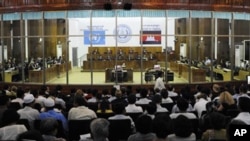WASHINGTON —
Most Cambodian staff at the U.N.-backed Khmer Rouge trial have gone on strike over unpaid wages.
Nearly 200 of the 250 staff members did not show up for work Monday in Phnom Penh to protest several months of unpaid wages.
A court spokesman says the tribunal faces a $3 million budget shortfall and staff have not been paid since June.
Citing concern over a possible disruption to the judicial process, U.N. spokesman Lars Olsen called for the Cambodian government to live up to its obligations.
"The U.N. continues to call upon the royal government of Cambodia to meet the obligation to pay the salaries, which they have failed to do since May," he said. "It is the responsibility of the royal government to pay this salary. And we are very concerned about the impact this strike might have on the judicial process and we are also concerned about the welfare of the national staff and their families."
Last week, Cambodian government spokesman Ek Tha appealed to the international community to provide more funds, saying Phnom Penh has paid enough.
The court has faced several funding problems since its founding in 2006, including a staff strike over unpaid wages in March of this year.
The court was set up to prosecute the top leaders of the Khmer Rouge regime, which is blamed for the deaths of nearly two million Cambodians during its bloody rule four year rule in the late 1970s.
The court has only handed down one conviction, and the advanced age of the remaining defendants has cast doubt on the prospects finishing its job while they are still alive, or able to participate in their trials for war crimes, genocide and crimes against humanity.
Nuon Chea and Khieu Samphan, both in their 80s, are the only senior Khmer Rouge leaders alive and considered fit to stand trial. They deny the charges. The group's leader, Pol Pot, died in 1998, and co-founder Ieng Sary died earlier this year.
Former Khmer Rouge prison chief Kaing Guek Eav, better known as "Duch," was sentenced last year to life in prison for his role in killing more than 14,000 while running the Tuol Sleng torture and execution center in Phnom Penh.
Nearly 200 of the 250 staff members did not show up for work Monday in Phnom Penh to protest several months of unpaid wages.
A court spokesman says the tribunal faces a $3 million budget shortfall and staff have not been paid since June.
Citing concern over a possible disruption to the judicial process, U.N. spokesman Lars Olsen called for the Cambodian government to live up to its obligations.
"The U.N. continues to call upon the royal government of Cambodia to meet the obligation to pay the salaries, which they have failed to do since May," he said. "It is the responsibility of the royal government to pay this salary. And we are very concerned about the impact this strike might have on the judicial process and we are also concerned about the welfare of the national staff and their families."
Last week, Cambodian government spokesman Ek Tha appealed to the international community to provide more funds, saying Phnom Penh has paid enough.
The court has faced several funding problems since its founding in 2006, including a staff strike over unpaid wages in March of this year.
The court was set up to prosecute the top leaders of the Khmer Rouge regime, which is blamed for the deaths of nearly two million Cambodians during its bloody rule four year rule in the late 1970s.
The court has only handed down one conviction, and the advanced age of the remaining defendants has cast doubt on the prospects finishing its job while they are still alive, or able to participate in their trials for war crimes, genocide and crimes against humanity.
Nuon Chea and Khieu Samphan, both in their 80s, are the only senior Khmer Rouge leaders alive and considered fit to stand trial. They deny the charges. The group's leader, Pol Pot, died in 1998, and co-founder Ieng Sary died earlier this year.
Former Khmer Rouge prison chief Kaing Guek Eav, better known as "Duch," was sentenced last year to life in prison for his role in killing more than 14,000 while running the Tuol Sleng torture and execution center in Phnom Penh.








